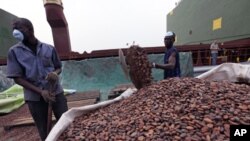Exports of Ivory Coast's cash crop cocoa are set to resume this week, but economists say the country's recent unrest may permanently end its standing as the world's top exporter of the chocolate ingredient.
You can't talk about the price of chocolate without bringing up Ivory Coast.
From New York to New Delhi, the going rate of chocolate's main ingredient, cocoa, is dependent on no single factor so much as the tropical nation's climate - particularly its political climate.
Ten years of on-and-off war in Ivory Coast, which contains the world's most productive stretch of cocoa-growing hillsides, has zig-zagged the price of chocolate like the needle on a Richter scale. During the recent power struggle, cocoa prices hit a thirty-two year high, after President Alassane Ouattara ordered a ban on cocoa exports as a way of depriving funds to predecessor Laurent Gbagbo, who refused to give up power.
Mr. Ouattara's forces arrested Mr. Gbagbo at the start of this month. With the end of major hostilities, cocoa exports are set to resume in a matter of days - and the country's crop is looking good thanks to torrential rains brought on by the global weather pattern La Niña.
But next year, as La Niña's wet weather turns dry, economists worry that this now-impoverished country will discover how much damage a decade of civil war has done to its cherished cash crop.
London-based cocoa analyst Kona Haque says that throughout the country's prolonged crisis, Ivorian leaders used the conflict as an excuse to treat the cocoa trade like their personal piggybank, bilking the nation's indigent farmers of the means to keep their fields fertile.
"The whole cocoa industry has been subject to political chaos, administrative burden, tax burden, a bit of too many middle man, resulting in the final farmer actually not reaping a lot from the final consumer price," said Haque.
Farmers, she says, have invested little in their farms because they've had little to invest. Much of the earnings from this otherwise profitable crop have been extorted by soldiers at highway checkpoints or by government lackeys manning ports, she adds.
Meanwhile, the average cocoa tree in the country is now an elderly 30 years old, long past its most productive years. For ten years, World Crops Editor Gary Mead says, Ivory Coast's farmers have sat idle and watched their trees age into barren firewood on fears that this war would never end.
"They've lived hand to mouth because that's the only way to be in the context of a possible war flaring up, militias, armed groups, you name it, all around them," said Mead. "You just don't bother. You grow enough, you produce enough, you're living from week to week."
Even if the nation's farmers were to find the money, time, and labor, to plant new trees tomorrow, it would take three to five years for those trees to bear their first golden cocoa pods, commodity traders say.
Meanwhile, in that intervening period, Ivory Coast may lose its venerated mantle as the world's top cocoa grower to Ghana, the state next door.
Ghana has become a celebrated example of a stable, democratic African state for the peaceful elections it has held since 1992. The country produces just a tad more than half of the cocoa Ivory Coast does today, but by 2015, Haque says Ghana could become the world's cocoa queen.
"We see Ghana as a major competitor," said Haque. "Ghana definitely has a government backed program to ensure that they do become a bigger payer in the field. It's vying for the top spot in the next two or three years maybe."
World Crops editor Gary Mead says Ivory Coast, meanwhile, will need hundreds of millions of dollars of investments just to keep the size of its cocoa crop from dwindling. There just isn't that kind of money looking to invest itself in cocoa these days, he adds, and even if there was, it's more likely to go to Ghana - where investors can be more sure of stable governance.
Ivorian President Ouattara's most daunting job, he says, is to bring enough peace to his country for the cocoa trade and the rest of the economy to reboot.
"Maybe he will prove himself to be a statesman-like figure and embrace the whole of the country and heal up all of those divisions that have been going on, but I'm not so sure about the people underneath him," he said.
Mr. Ouattara boasts a stellar economic record, having lifted his country from a recession during his reign as prime minister in the early 1990s. But Mead's concern, he says, is that even the most remarkable economic whiz would have little sway over a government that is now addicted to corruption from its cocoa crop.
"I just fear that there's been a kind of acclimatization of corruption in the country," said Mead. "It will be too tempting for people beneath Ouattara to say, 'Now its out turn. We've been waiting for this. Now it's our turn.'"
President Ouattara is still trying to bring calm and stability to Ivory Coast. The United Nations says the recent four-month power struggle killed hundreds of people and displaced about 1 million others, with many fleeing to Liberia and Ghana.
Ivory Coast May Lose Mantle As World's Top Cocoa Grower
- By Drew Hinshaw




